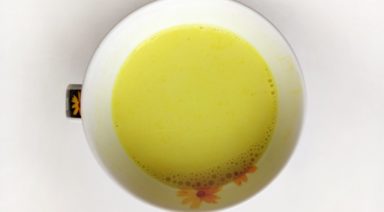The Wonderful Benefits of Japanese Knotweed

While the anti-cancer and brain-healing resveratrol is found in grapes, blueberries, peanuts, cashews. cocoa powder, and wine, this powerful antioxidant is wildly abundant (more than grapes) in Japanese Knotweed. Resveratrol is unusually powerful and a natural phenol, found in a unique group of micronutrients with antioxidant properties.
This puts Knotweed in an elite class of supremely healing and helpful herbs. In recent years, it’s become a vital medicinal, culinary, and ceremonial herb throughout Korea, China, and Japan, and within several spiritual communities in the United States and Europe.
This beautiful green and white plant is also extremely fertile. When planted among other vegetation, Japanese Knotweed becomes invasive and ravages the land, often consuming neighboring crops. Because it’s also difficult to eradicate, some folks consider this herb an enemy. Japanese Knotweed is also known as Itadori tea. The Japanese word itadori can be translated as “remove pain.” It’s used in traditional Chinese and Japanese medicine. Meanwhile, when foraged in the wild, its young stems are edible, albeit sour, with a flavor reminiscent of rhubarb. The plant can be found in 39 of the 50 United States.
Japanese Knotweed Is A Natural Laxative
Infused within its cells is a bowel regulator known as emodin, which makes Japanese Knotweed an excellent, natural laxative. Emodin also turns the weed into an effective healer of stomach ailments, cramps, bloating, and gastrointestinal issues like constipation. Unfortunately, many herbalists and distributors of the herb use processes that maximize the resveratrol, while reducing the amount of emodin in the final product.
Let’s Get To The Full List of Benefits!
Japanese Knotweed has a variety of reported benefits, including:
Cancer Management: Given the immense immune effects of resveratrol, and because Japanese Knotweed is proving itself powerful, separate from resveratrol, many studies are reporting how effective the weed is when administered to cancer patients and those with autoimmune disorders. Even the NIH has reported that Japanese Knotweed has clear positive biological effects on human cells.
Improvement of brain health and memory: The plant-derived polyphenol resveratrol has been reported to help the brain heal and experience a degree of age-reversal.
Improvement of cognitive performance: Regular consumption of Japanese Knotweed can enhance cerebrovascular function. In other words, it can help one to be more clear, focused, and productive.
Improvement of mood: if you’d like to take a slight edge off of your personality, this powerful weed can improve your mood, attitude, and mindset.
Neutralizer of free radicals: Free radicals are unstable atoms that can damage cells, which can cause or trigger disease and aging. When free redials overwhelm our bodies, our systems can fail and we can experience oxidative stress. Japanese Knotweed can help reduce the effects of free radicals and improve the human body’s ability to heal itself.
Modulator of blood pressure: Japanese Knotweed has a positive impact on your arteries and blood flow. With less strain and blockages, our cardiac health improves. When these things improve, other aspects of the body improve as well. The weed also helps to prevent blood clots.
Reducer of constipation, bloating, and cramps: Because of the emodin in Japanese Knotweed, it can help to ease most challenges occurring in the stomach.
Healer of respiratory infections: indigenous peoples have been using Japanese Knotweed to treat many ailments, including respiratory, lung, and other infections.
Regulator of insulin levels: Because it moderates and balances insulin levels in the blood, Japanese Knotweed can promote healthy blood sugar levels.
Improved absorption of Vitamins A and C. Japanese Knotweed also contains potassium, zinc, phosphorus, and manganese.
And it may also:
- Potentially increase testosterone
- Improve estrogen metabolism and may reduce the risk of breast cancer
- Reduce reactions to hay fever
- Reduce acne and improve skin health
- Reduce inflammation
- Have a positive effect on blood fats
- Shows potential in combating viruses and bacteria
Additionally, Japanese Knotweed helps to slow the processes related to aging, and to establish healthy blood vessel function, improved nerve and liver function, and improved cardiovascular and heart health.
Warning To Knotweed Lovers
As with every delicious indulgence in our lives, Japanese Knotweed comes with a few alarms. If you consume too much of it, you could easily experience negative reactions. Here are a few things to keep in mind:
- If you’re anemic, Japanese Knotweed might not be safe for you.
- It might interact (that’s not a good thing) with a few prescription drugs and popular supplements.
- High doses can be harmful. Even small doses can be harmful to certain people.
- The long-term effects related to consuming Japanese Knotweed are unknown.
If you’re excited about diving into Japanese Knotweed, consult with a nutritionist, Ayurvedic practitioner, or herbal remedy consultant.
If you’re into foraging for herbs in the nearby wilderness, keep in mind that Japanese Knotweed has a few doppelgängers, including Bindweed, Himalayan Balsam (Knotweed and Honeysuckle too!), Bamboo, Broad-leaved Dock, Russian Vine, and Lilac. When hunting for nutritional herbs, it’s always best to have a slew of images of the herb so you can be certain, when bringing your collected herbs home.
As with all things found in the forest, be careful to remove clinging vines and flowers that attach themselves to your favorite herbs. You’ll also want to clean your herbs before creating your tinctures and teas. You can submerge them in warm water with a little apple cider vinegar for an hour or so – then they’re good to go!
It’s always a great time to explore what our beautiful planet is growing for us. Making tinctures, salves, and teas is relatively simple, and it feels so good to work with the Earth’s gifts to heal ourselves and our loved ones. Wishing you all good health, happy hearts, and expanded spirits!
Why Do We Sleep? For More Reasons Than You May Think

Most of us spend about a third of our lives asleep, despite not really having an answer to the question, ‘why do we sleep?’ Now neuroscientists are realizing that sleep is more important than previously thought. They’re also realizing that the worn-out platitude, “you can sleep when you die,” is terrible advice, as that day will undoubtedly come sooner if you short yourself on a good night’s sleep.
According to most contemporary research, you should be getting around seven to eight hours of sleep every night, and if you think you can get by on fewer than that, there’s a really good chance you’re fooling yourself.
Why is Sleep Important?
While the exact mechanisms of sleep are still being studied, neuroscientists including Matthew Walker have made interesting learnings about what happens when we deprive ourselves of sleep and the impacts sleep (or lack thereof) has on society as a whole.
When we’re awake, Walker says that essentially, we’re causing low-level brain damage. By this, he is referring to the build-up of the sticky, toxic junk in our brain known as beta-amyloid. This accumulation of beta-amyloid has been found to correspond with the onset of Alzheimer’s, among many other adverse health effects correlated with a lack of sleep.
Sleep is beneficial as more than just a healing function; it also replenishes spent resources and regulates hormone levels that dictate our appetite, cognitive function, and motor skills. The two hormones that dictate whether we are hungry or full, ghrelin and leptin, have been observed to flare up and down, respectively, when we’re sleep deprived. This inevitably leads to an increase in hunger, but even worse, it leads our bodies to crave unhealthy and fattening foods — those heavy on carbs and light on greens. In fact, people who run on four to five hours of sleep per night tend to eat 200-300 more calories per day.
For men, sleep is an important regulator of hormones, most notably testosterone. Sleep-deprived males can have the same virility and strength as a man 10 years their senior. For women, a lack of sleep can lead to a significantly increased risk of breast cancer and drops in immune hormones.
According to Walker, just introducing a single night of just four hours of sleep among a normal eight-hour sleep schedule, can bring about a 70 percent drop in natural cancer-killing cells, the immune assassins that target malignant carcinogens. Every day our bodies produce these cells and others to fend off disease and maintain our health, and while a cat nap might make you feel refreshed, it won’t make up for the loss of these cells.





































